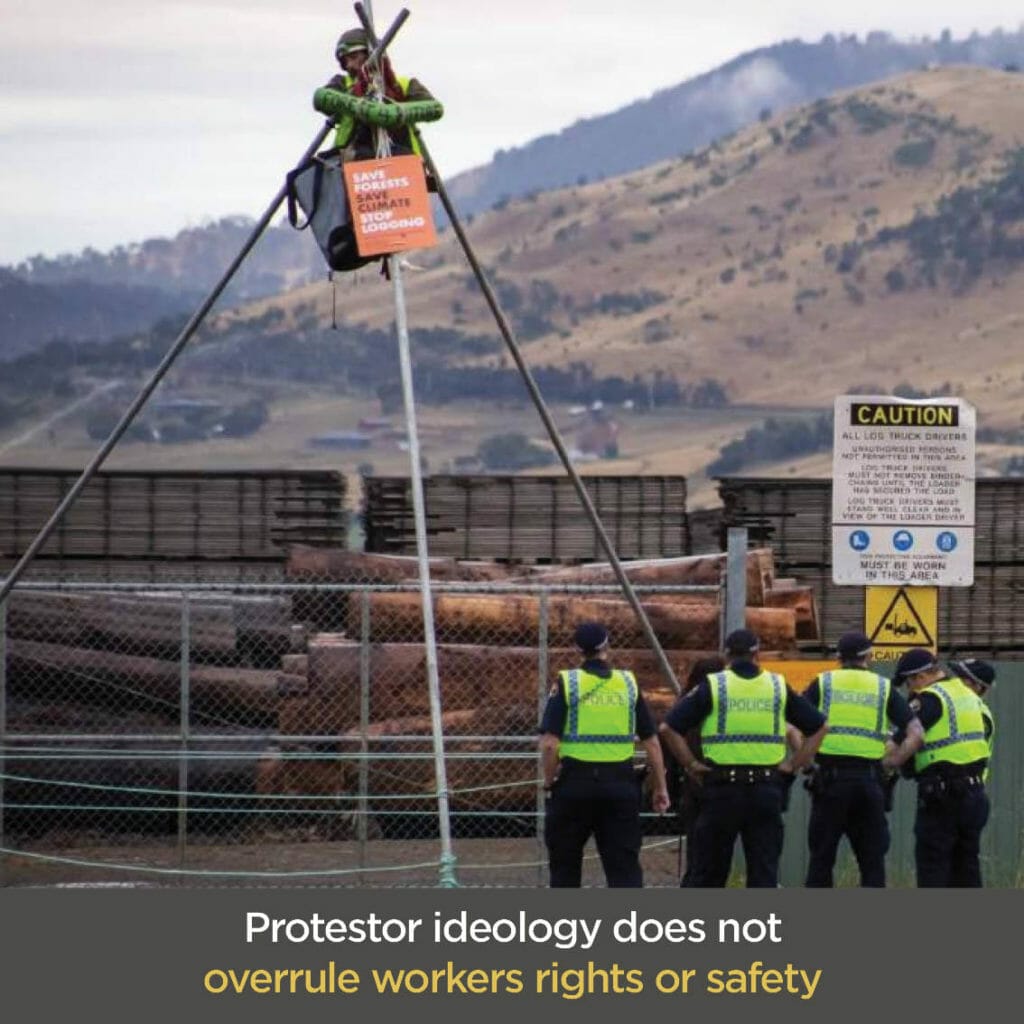New anti -protest laws are not designed to stop peaceful protesters but rather to deter those who wish to illegally enter and disrupt workplaces, writes Nick Steel.

I BELIEVE that all Tasmanians support people’s right to protest peacefully. The problem that has arisen is that some protesters are being actively encouraged to behave like they are above the law and exempt from common decency.
In a modern and democratic society, public safety and the mental health of workers needs to be paramount. The days of protesters invading workplaces, and intimidating and placing undue stress upon staff to make their point, must come to an end.
What is being proposed in the government’s new Police Offences Act is an amendment to public annoyance and trespass. Both very serious issues when dealing with illegal workplace invasions, where protesters enter a worksite and chain themselves to privately owned equipment.
This legislation is designed to assist police in dealing with this illegal act, because the current penalties are not enough to deter those who wish to illegally enter and disrupt workplaces.
This is not anti -protest legislation. The right to protest is protected, as is the right to peacefully go about your work, and that is the balance that the legislation seeks to achieve.
Recent examples demonstrate there are ways to protest peacefully and lawfully, like the Unions May Day public rallies, the Climate Action Rally, the regular (and legal) use of public spaces such as Parliament Lawns, in Hobart, which is used by many to provide a platform to voice their opinions.
The legislation supports freedoms of expression and freedom of assembly, as it should because we don’t want to see the right to protest come to an end. But is also draws a line between civil protests and what are quite horrible and malicious attacks on individuals in their place of work.
The impact of these attacks on workers’ mental health, morals and their personal character is real.
The forestry industry is a proud and passionate family of regional workers who know that forestry is the industry of the future. From biofuels to plastic alternatives and environmentally friendly construction materials, this industry would have to be one of the most progressive and in demand in the world.
The science of forestry is now well understood, and we are delivering on our promise to continually improve and create a balance of both protection and production.
Despite this, it is the ideology of some, who are not listening to the advice of scientists, and are resisting the global move towards local production of climate-friendly forest products, who are continually disrupting workplaces illegally.
You can’t have that discussion with these protesters. They agree that they want timber products, they want plastic alternatives, they want more housing built.
They just want it to come from somewhere else, anywhere else. And there lies the problem, these “branded” protesters have been taught that their ideology is more important than the law or showing respect for others.
They have found a loophole in the law where the punishment doesn’t fit the crime and they dismiss the human impact.
Human impact is important, and it is this that has brought on the need for changes to the legislation, to make the punishment fit the crime.
As large regional employers our industry understands its obligations when looking after the mental health and wellbeing of workers.
Following an incident staff need support, some need time off and some are traumatised for months. It really is that serious for us.
Just imagine what would happen if someone invaded your office building, worksite, school or factory. There would be outrage and a series of support measures immediately put in place to support all those affected. That’s what we have to do, every time.
These invasions and the trauma they cause are followed by cheers from environmentalists, token fines paid for by a charity and then unbelievably a platform to brag about it using social and traditional media.
People straight out of court, who have been found guilty of a crime and charged are then given an opportunity to brag about it. Not many criminals get that opportunity, society wouldn’t stand for it.
This is a clear sign that the punishment does not fi t the crime and these extremists have been allowed, by a shortcoming of the law, to make a mockery of the courts, the police processes, and societies expectation that ALL workplaces be safe and free from bullying and intimidation. It’s time to show the same respect for forestry that all other businesses enjoy and recognise that our local forestry industry is modern, environmentally responsible and is critical to supporting local businesses.
We are an important part of your community and we support you.
All we ask is for reasonable protection of the Tasmanian forestry industry and our workers from extremist behaviour.
Nick Steel is the Chief Executive Officer of the Tasmanian Forest Products Association.
